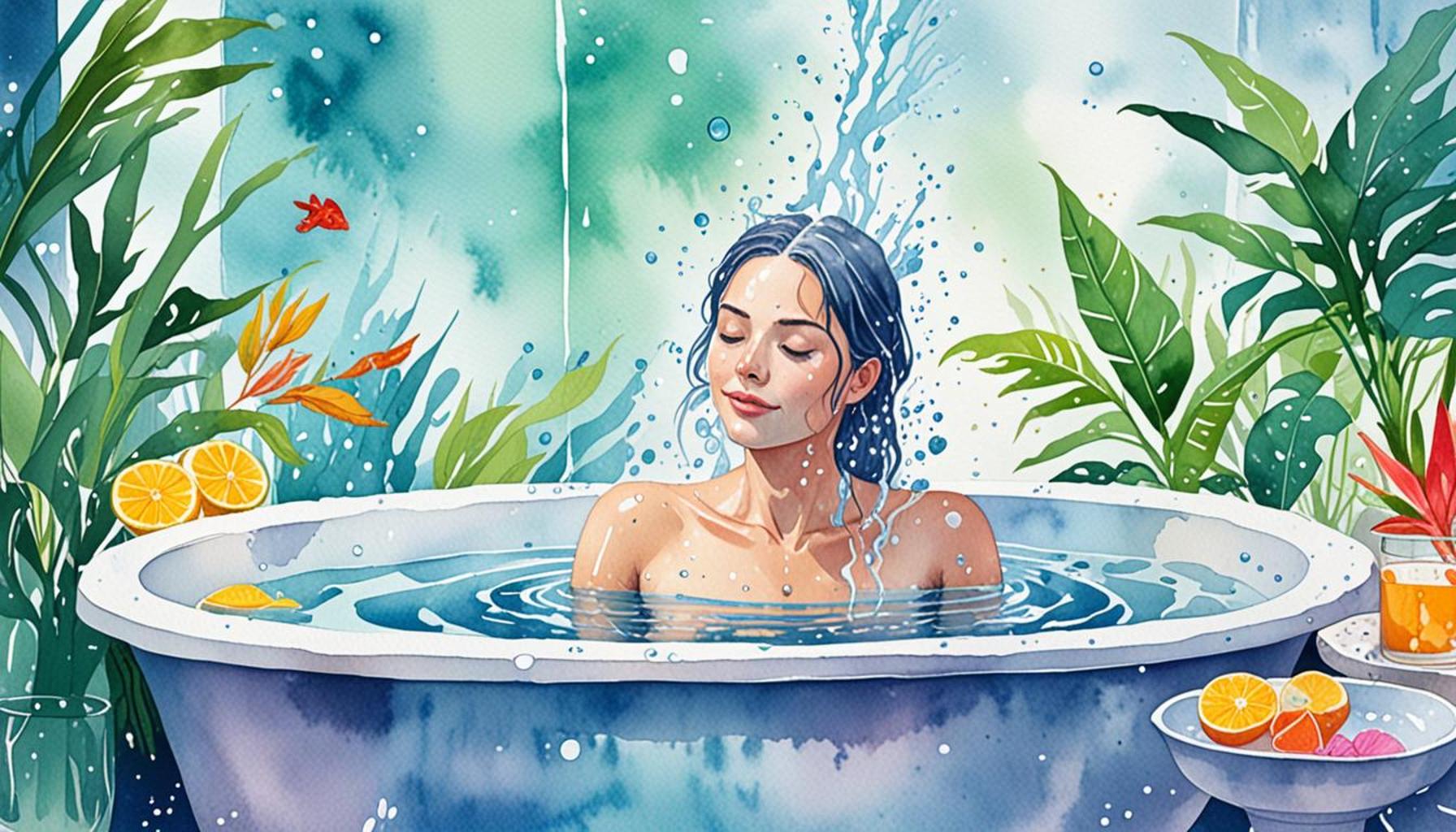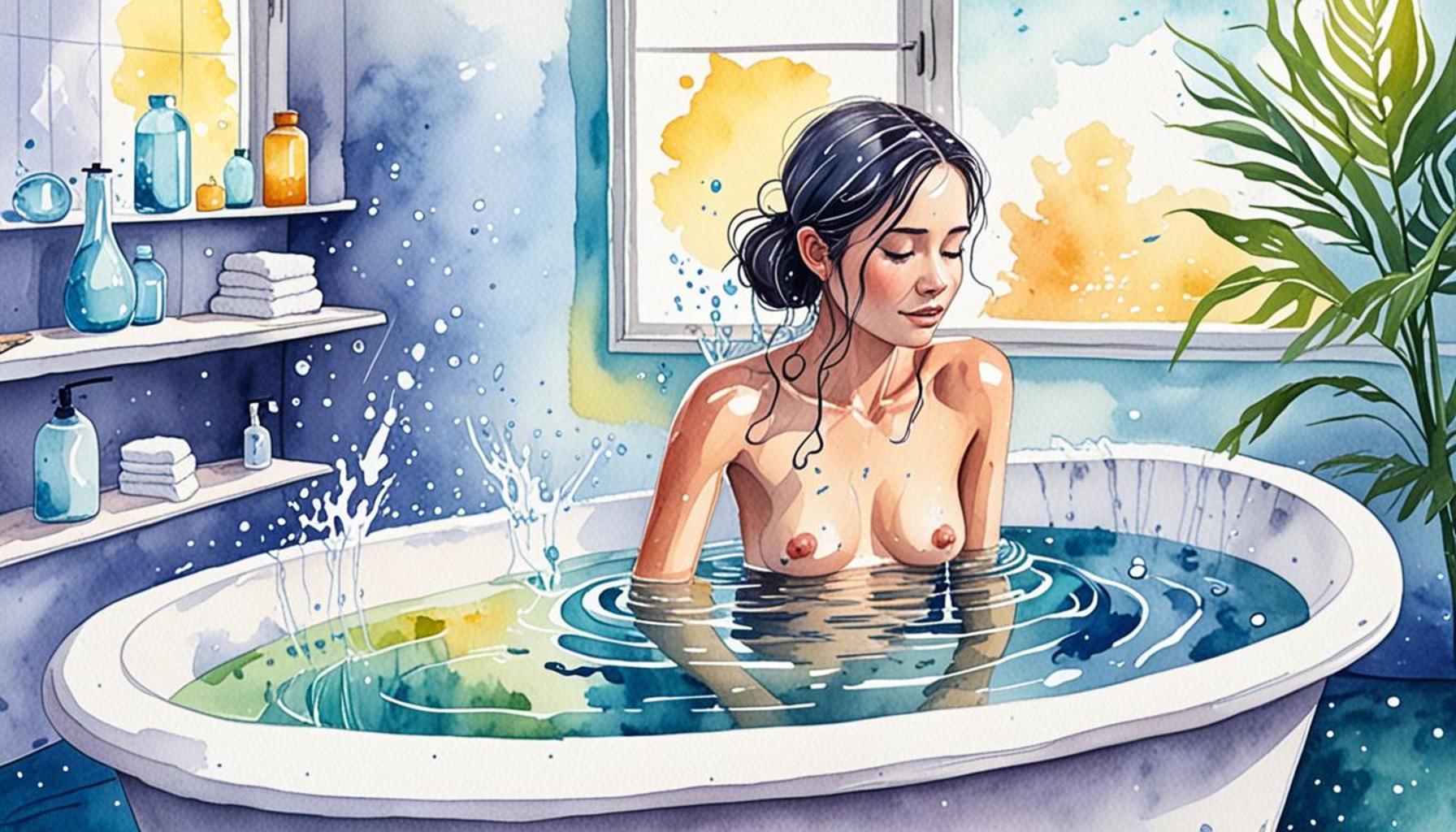The Sensory Experience of Water: Cultivating Emotional Awareness through Bath Meditation

Unlocking the Power of Water for Emotional Healing
Water is a fundamental element of nature that plays a vital role in our emotional well-being. Its remarkable ability to engage our senses goes beyond mere physical interaction. The gentle trickle of a stream, the rhythmic crashing of ocean waves, or the serene stillness of a lake each contribute to a rich tapestry of sensory experiences that can substantially enhance our emotional state.
Among the myriad ways to connect with water, bath meditation emerges as a particularly profound practice. By submerging ourselves in warm water, we not only relax our bodies, but we also cultivate emotional awareness. This practice can be understood through various sensory elements:
- Sound: The continuous trickling or splashing of water can create a cerebral atmosphere. The sounds of water have been researched for their calming effects on the brain, helping to mask distracting noises and plunge you into a meditative state. This is why many people find such peace near lakes, rivers, or the ocean.
- Touch: The warmth of the water serves as a therapeutic embrace. This tactile sensation evokes a profound sense of safety and comfort, akin to being wrapped in a cozy blanket. Many therapists recommend warm baths as a tool for relaxation, underscoring their importance in stress relief.
- Scent: Incorporating essential oils, such as lavender for relaxation or eucalyptus for rejuvenation, can profoundly impact your emotional state. The process of aromatherapy, combined with the serenity of a bath, provides an inviting atmosphere conducive to introspection.
Throughout this exploration of bath meditation, we come to realize that engaging with water allows us to delve deeper into our emotions and cultivate mindfulness. Beyond its obvious relaxation benefits, this practice can be a gateway to understanding our emotional landscapes. For instance, taking the time to reflect while in water can reveal feelings that we may have suppressed during our everyday hustle.
Furthermore, numerous psychological studies have indicated that routines involving water can enhance mood and reduce feelings of anxiety and depression. By offering simple techniques, we can craft our own bath meditation experiences tailored to individual needs. You might find yourself discovering new emotional insights simply by allowing water’s rhythm to guide you.
In conclusion, as you embark on this journey of self-exploration, consider the depths of emotional awareness that await just beneath the surface. Embrace the healing potential of water, partake in a bath meditation, and witness firsthand its transformative effects on your emotional growth.

DIVE DEEPER: Click here to discover the healing power of visualization
The Sensory Landscape of Water in Bath Meditation
Embracing the sensory experience of water is not merely a playful indulgence; it is a deliberate embarkation on a journey of self-discovery and emotional growth. As you settle into a warm bath, the sensory elements begin to unfold, creating a personal sanctuary where the pressures of the outside world dissipate. Understanding how sound, touch, and scent converge in this tranquil space is crucial for maximizing the benefits of bath meditation.
The Calming Symphony of Water Sounds
The audibility of water creates an enchanting backdrop for contemplation. When submerged in a warm bath, one can tune into the subtle sounds of the water, whether it’s the soft splashing of droplets or the soothing gurgle of bubbles. Studies demonstrate that listening to these water sounds can lower cortisol levels, subsequently reducing stress. Chaos feels further away, allowing for a mental reprieve where one can introspect in peace. Research from the University of Sussex highlights that sounds from nature, such as running water, facilitate deeper concentration and relaxation, making bath meditation a perfect practice for enhancing mindfulness.
The Embrace of Warm Water
The tactile sensation of warm water enveloping the body is perhaps the most powerful aspect of bath meditation. The water serves as a gentle cocoon that shields you from external pressures, creating a *sense of safety* and serenity that invites emotional exploration. According to health experts, warm baths can reduce muscle tension and promote blood circulation, which allows a cascade of relaxation to wash over you. This, in turn, creates a conducive environment for emotional awareness, helping you connect with feelings that may lie beneath the surface of your daily life.
Aromatherapy: Elevating Emotional States
Enhancing your bath with essential oils opens the door to a full-bodied sensory experience. Incorporating scents like lavender or chamomile transforms the bath not only into a physical retreat but also a therapeutic experience. Neuroscience research reveals that certain aromas can trigger emotional responses, activating pathways in the brain that help regulate mood. When combined with the calming nature of water, these scents invite a deeper level of introspection, allowing individuals to unpack emotional baggage while relaxing in their privately curated oasis.
- Lavender: Known for its calming effects, it can significantly improve sleep quality and reduce anxiety.
- Eucalyptus: This invigorating scent helps rejuvenate the spirit, offering clarity and a sense of revitalization.
- Rose: Associated with feelings of love and self-acceptance, rose essential oil can foster emotional healing during meditation.
As you immerse yourself in this multifaceted sensory experience, you inevitably cultivate a greater emotional awareness, paving the way for healing and understanding. Each element—the sound of water, the warmth that embraces, and the aromatic whispers of essential oils—plays a unique role in guiding you toward a more profound connection with your emotions. In the pursuit of self-discovery, water becomes a trusted ally, revealing insights that lead to personal growth.
The Sensory Experience of Water: Cultivating Emotional Awareness through Bath Meditation
Bath meditation is a transformative practice that taps into the soothing properties of water, guiding individuals through a journey of emotional awareness and mindfulness. The sensory experience of water can evoke feelings of tranquility, comfort, and reflection, making it a perfect medium for meditation. This experience is not just about physical sensations; it connects deeply with our emotional states, helping us understand and process our feelings.When one immerses themselves in water, the sensory engagement begins to awaken various emotional responses. The warmth of the water can promote feelings of safety, while the sound of water gently lapping against the sides of the tub can provide a meditative backdrop that invites mental stillness. Studies have shown that exposure to water captivates our attention and can significantly lower stress levels, which in turn fosters an environment conducive to emotional exploration.During bath meditation, individuals might consider employing specific techniques to deepen their connection with water. For example, focusing on the rhythmic sound of water being poured, or the subtle caress of warm liquid against the skin can enhance awareness of bodily sensations, allowing for a greater appreciation of the present moment. This practice encourages self-compassion and emotional processing, as one reflects on internal thoughts and feelings that surface during this intimate experience with water.In addition, incorporating essential oils or bath salts can elevate this meditation practice, offering additional sensory layers such as scent and texture. The act of creating a personalized bathing environment can reinforce the sense of control and intention, contributing to an overall enhanced mental state. Each aspect of the experience can be tailored to fit individual preferences, making every bath a unique opportunity for self-discovery and emotional connection.To further stimulate interest, consider exploring the benefits of bathing with intention, or how different water temperatures can affect emotional responses. Engaging with this practice can illuminate pathways to mindfulness, peace, and ultimately, emotional well-being, revealing the profound impact that water has on our psychological health.
| Category | Advantages |
|---|---|
| Emotional Awareness | Enhanced self-reflection leading to deeper understanding of one’s emotions. |
| Mindfulness | Immersion in sensory experience promotes mental clarity and reduces anxiety. |
DIVE DEEPER: Click here to discover the power of conscious breathing
Deepening the Connection: Reflections and Insights from Bath Meditation
As the healing effects of bath meditation unfold, an important aspect to consider is the introspection and reflection it encourages. Engaging in this calming ritual offers an invaluable opportunity to connect with your thoughts and emotions. The stillness of water fosters a space where you can confront feelings that may otherwise seem elusive due to the fast-paced nature of daily life. This emotional exploration can lead to deeper self-awareness and clarity, allowing one to explore their inner landscape effectively.
Journaling: A Complementary Practice
Integrating journaling into your bath meditation can magnify the benefits of introspection. Once you have settled into the warmth of the water, consider keeping a journal within reach. As thoughts arise during your bath, jot down reflections to contextualize your emotional experiences. Research indicates that expressive writing can enhance mental well-being, helping individuals process emotions more effectively. This practice encourages a dialogue with oneself, birthing insights that can illuminate patterns in behaviors or feelings that might have remained unnoticed.
The Role of Guided Visualization
Another powerful technique to employ during bath meditation is guided visualization. Imagine the water surrounding you as a dynamic force, embodying an emotional metaphor—perhaps it represents a cleansing wave washing away negativity or a gentle current propelling you towards transformation. This form of meditation has been shown to promote relaxation while also enhancing a person’s ability to manage anxiety and depression. Harvard Medical School highlights that guided imagery can significantly improve emotional regulation, making it an effective strategy to incorporate into bath meditation.
Creating Your Unique Bath Meditation Ritual
Customization is key when it comes to bath meditation. By creating a personal ritual tailored to your specific emotional needs, you can make each bathing session a deeply enriching experience. Consider factors such as lighting, temperature, and even music. For a more immersive experience, use dim lighting or candles to create a calming ambiance while listening to soothing playlists or nature sounds. Studies suggest that ambient music has profound effects on emotional states, promoting relaxation and reducing tension. By curating an environment that resonates with you, you’ll find that your emotional awareness deepens significantly.
While many reach for standard bath products, exploring natural ingredients can elevate your practice. For instance, adding Epsom salts can not only enhance the experience but also offer therapeutic benefits for muscle relaxation. The magnesium-rich salts can help lower stress levels and promote calmness during your bath, leading to a more tranquil state of mind for emotional introspection.
Engaging with Nature: Bringing Elements of the Outdoors Inside
To fully utilize the sensory experience of water, consider incorporating natural elements from your surroundings into your bath meditation. Adding river stones, floating flowers, or even birthing a miniature spa environment with plants can bridge the gap between your indoor refuge and the serenity of nature. This practice aligns with the concept of biophilia, which suggests that humans have an intrinsic connection to the natural world. By surrounding yourself with these elements, you not only deepen your sensory engagement with the bath but also facilitate a more profound emotional release.
Ultimately, the journey of emotional awareness through bath meditation showcases how sensory experiences intertwine seamlessly for self-discovery and healing. As each bath potentially becomes a unique exploration of one’s emotional landscape, the tranquil environment of water serves as an ally on this enriching quest.
DISCOVER MORE: Click here to delve into meditation techniques
Conclusion: Embracing the Healing Waters for Emotional Growth
In a world that often prioritizes speed over stillness, bath meditation emerges as a transformative practice that invites us to slow down, listen to our inner selves, and embrace the profound healing potential of water. The sensory experience of water not only calms the mind but also opens the door to emotional exploration, allowing us to confront the layers of our feelings that may be buried beneath the surface. Through the ritual of bathing, we find a sanctuary for introspection that promotes self-awareness and facilitates emotional clarity.
Integrating practices such as journaling and guided visualization into our bathing routines enables us to deepen our understanding of our emotions, helping us recognize patterns in our behavior and thoughts. As we cultivate this emotional awareness, we can effectively harness our inner strength and resilience. Customizing our bath experience, whether through lighting, music, or natural elements, not only enhances relaxation but creates a safe harbor for self-discovery.
As you embark on your own journey of bath meditation, remember that each session is a unique opportunity to engage with your emotions and the calming essence of water. By embracing these moments of stillness, you not only allow yourself to recharge but also strengthen the vital connection between your mind, body, and spirit. Ultimately, the sensory experience of water can lead to profound emotional healing, guiding you on a path of self-compassion and growth. Dive in, and allow the healing waters to wash over you, leading you towards a more insightful and emotionally aware life.



